Saturday, May 23, 2020
Daily Marian Prayer And Image
From The Glories Of Mary, by Saint Alphonsus de Liguori:
O holy and heavenly Infant, Thou who art the destined Mother of my Redeemer and the great mediatress of miserable sinners, pity me. Behold at thy feet another ungrateful sinner who has recourse to thee and asks thy compassion.
It is true, that for my ingratitude to God and to thee I deserve that God and thou should abandon me; but I have heard, and believe it to be so (knowing the greatness of thy mercy), that thou dost not refuse to help any one who recommends himself to thee with confidence.
O most exalted creature in the world! since this is the case, and since there is no one but God above thee, so that compared with thee the greatest saints of heaven are little; O saint of saints, O Mary! abyss of charity, and full of grace, succor a miserable creature who by his own fault has lost the divine favor.
I know that thou art so dear to God that he denies thee nothing. I know also that thy pleasure is to use thy greatness for the relief of miserable sinners. Then, show how great is the favor that thou enjoyest with God, by obtaining me a divine light and flame so powerful that I may be changed from a sinner into a saint; and detaching myself from every earthly affection, divine love may be enkindled in me. Do this, O Lady, for thou canst do it. Do it for the love of God, who has made thee so great, so powerful, and so compassionate. This is my hope.
Amen.
Friday, May 22, 2020
Daily Marian Prayer And Image
From The Glories Of Mary, by Saint Alphonsus de Liguori:
O, my Immaculate Lady! I rejoice with thee on seeing thee enriched with so great purity. I thank, and, resolve always to thank, our common Creator for having preserved thee from every stain of sin; and I firmly believe this doctrine, and am prepared and swear even to lay down my life, should this be necessary, in defence of this thy so great and singular privilege of being conceived immaculate.
I would that the whole world knew thee and acknowledged thee as being that beautiful "Dawn" which was always illumined with divine light; as that chosen "Ark" of salvation, free from the common shipwreck of sin; that perfect and immaculate "Dove" which thy divine Spouse declared thee to be; that "enclosed Garden" which was the delight of God; that "sealed Founain" whose waters were never troubled by an enemy; and finally, as that "white Lily," which thou art, and who, though born in the midst of the thorns of the children of Adam, all of whom are conceived in sin, and the enemies of God, wast alone conceived pure and spotless, and in all things the beloved of thy Creator.
Permit me, then, to praise thee also as thy God himself has praised thee: Thou art all fair, and there is not a spot in thee ("Tota pulchra es, Amica mea, et macula non est in te"—Cant. iv. 7). O most pure Dove, all fair, all beautiful, always the friend of God. O how beautiful art thou, my beloved! How beautiful art thou! ("Quam pulchra es, amica mea, quam pulchra es!"—Ib. 1).
Most sweet, most amiable, immaculate Mary, thou who art so beautiful in the eyes of thy Lord, disdain not to cast thy compassionate eyes on the wounds of my soul, loathsome as they are. Behold me, pity me, heal me.
O beautiful loadstone of hearts, draw also my miserable heart to thyself.
O thou, who from the first moment of thy life didst appear pure and beautiful before God, pity me, who not only was born in sin, but have again since baptism stained my soul with crimes.
What grace will God ever refuse thee, who chose thee for his daughter, his Mother, and Spouse, and therefore preserved thee from every stain, and in his love preferred thee to all other creatures? I will say, in the words of St. Philip Neri, "Immaculate Virgin, thou hast to save me."
Grant that I may always remember thee; and thou, do thou never forget me. The happy day, when I shall go to behold thy beauty in Paradise, seems a thousand years off; so much do I long to praise and love thee more than I can now do, my Mother, my Queen, my beloved, most beautiful, most sweet, most pure, Immaculate Mary.
Amen.
Thursday, May 21, 2020
Daily Marian Prayer And Image
From The Glories Of Mary, by Saint Alphonsus de Liguori:
O Mother of mercy, since thou art so compassionate, and hast so great a desire to render service to us poor creatures and to grant our requests, behold I, the most miserable of all men, have now recourse to thy compassion, in order that thou mayest grant me that which I ask. Others may ask what they please of thee,—bodily health, and earthly goods and advantages; but I come, O Lady, to ask thee for that which thou desired of me humility and love of contempt.
Thou wast so patient under the sufferings of this life; obtain for me patience in trials.
Thou wast all filled with the love of God; obtain for me the gift of his pure and holy love.
Thou wast all love towards thy neighbor; obtain for me charity towards all, and particularly towards those who are in any way my enemies. Thou wast entirely united to the divine will; obtain for me entire conformity to the will of God in whatever way he may be pleased to dispose of me.
Thou, in fine, art the most holy of all creatures; O Mary, make me a saint. Love for me is not wanting on thy part; thou canst do all, and thou hast the will to obtain me all. The only thing, then, that can prevent me from receiving thy graces is, either neglect on my part in having recourse to thee, or little confidence in thy intercession; but these two things thou must obtain for me. These two greatest graces I ask from thee; from thee I must obtain them; from thee I hope for them with the greatest confidence, O Mary, my Mother Mary, my hope, my love, my life, my refuge, my help, and my consolation. Amen.
Ascension Thursday

Happily, the Archdiocese of Boston adheres to the old rule, that the Ascension falls 40 days after Easter, on a Thursday. And even if it didn't, since I follow the 1962 Ordo (with some exceptions and additions) today would still be Ascension Thursday, a holy day of obligation.
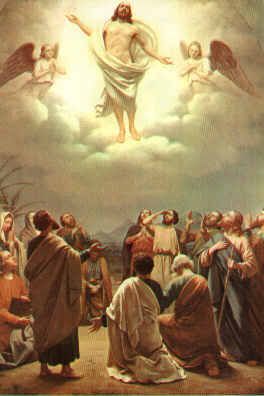
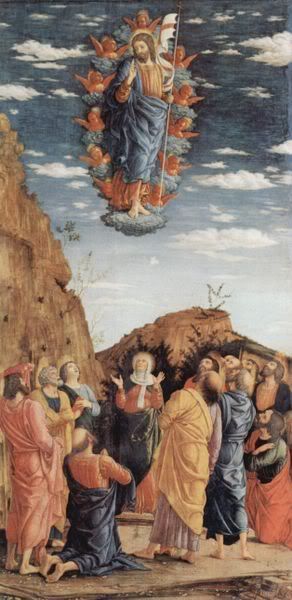
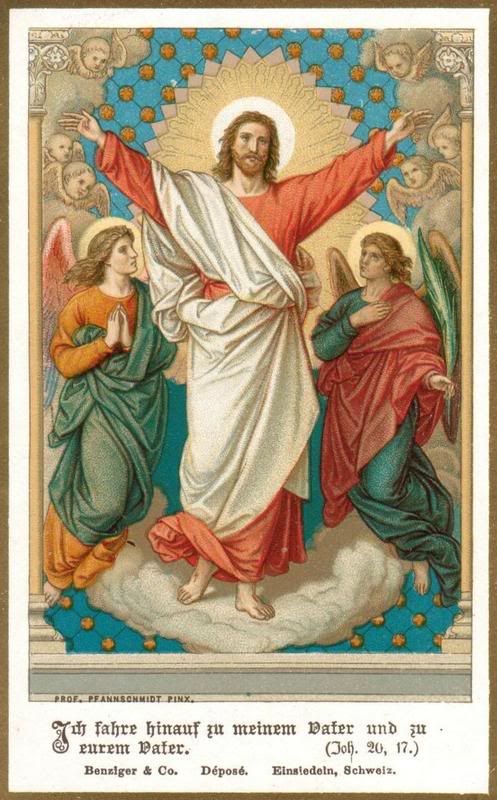
Wednesday, May 20, 2020
Daily Marian Prayer And Image
From The Glories Of Mary, by Saint Alphonsus de Liguori:
O Queen of heaven, Mother of holy love! since thou art the most amiable of creatures, the most beloved of God, and his greatest lover, be pleased to allow the most miserable sinner living in this world, who, having by thy means been delivered from hell, and without any merit on his part been so benefited by thee and who is filled with love for thee, to love thee.
I would desire, were it in my power, to let all men who know thee not know how worthy thou art of love, that all might love and honor thee. I would desire to die for the love of thee, in defence of thy virginity, of thy dignity of Mother of God, of thy Immaculate Conception, should this be necessary, to uphold these thy great privileges. O my most beloved Mother, accept this my ardent desire, and never allow a servant of thine, who loves thee, to become the enemy of thy God, whom thou lovest so much.
Alas! poor me, I was so for a time, when I offended my Lord. But then, O Mary, I loved thee but little, and strove but little to be beloved by thee. But now there is nothing that I so much desire, after the grace of God, as to love and be loved by thee. I am not discouraged on account of my past sins, for I know that thou, O most benign and gracious Lady, dost not disdain to love even the most wretched sinners who love thee; nay more, that thou never allowest thyself to be surpassed by any in love.
Queen most worthy of love, I desire to love thee in heaven. There, at thy feet, I shall better know how worthy thou art of love, how much thou hast done to save me; and thus I shall love thee with greater love, and love thee eternally, without fear of ever ceasing to love thee.
O Mary, I hope most certainly to be saved by thy means. Pray to Jesus for me. Nothing else is needed; thou hast to save me; thou art my hope. I will therefore always sing O Mary, my hope, thou hast to save me.
Amen.
Rogation Wednesday and the Vigil of the Ascension
One of the glories of Catholicism is its ability to incorporate so many varying interests in aspects of our Catholic Faith under the same general rubric. Some Catholics are devoted to the Rosary, others to the Sacred Heart. Some especially revere Our Lady of Mount Carmel, others Our Sorrowful Mother. Some love the devotion of the Five Sacred Wounds, while others cling just as doggedly to the devotion of the Fifteen Os of Saint Bridget. Some are clients of this saint, some of that.
The Church's manner of accommodating so many varying interests has been to foster guilds devoted to these aspects of Catholic piety. The creation of a group of people devoted to a particular aspect of the Faith allows like-minded folks to interact, but at the same time keeps them within the bounds of our Mother the Church. The Church, in the modern parlance, is a "Big Tent." So long as you adhere to the Magesterium in matters of faith and morals, and live within the Church and its teachings, no one is going to make a fuss if you prefer to pray to St. Michael as the escort of souls, or to St. Joseph as the patron of a happy death, or to the general patronage of Our Blessed Lady, when you pray for a happy and holy death.
Guilds for a particular devotion have a long history, and were present in England before the protestant rebellion. They thrived in the 19th century, and were still going strong before the post-Vatican II tidal wave nearly wrecked everything. I believe, though I don't have any evidence to support this at the moment, that they are making a quiet comeback today. Where the Church is healthy, you will still find active St. Vincent de Paul Societies, and busy Holy Name Societies. The Spanish Penitents I profiled during Holy Week are modern devotional guilds.
As I said, the devotional guilds were a part of Catholic life well before the 1500s. And of course, as the parish community processed on important feast days, like the Rogation Days, the guilds took part. The processed together as a group (and one can imagine that the parish priest had to diplomatically allot the guilds' respective places in the procession).
Each group had some sort of banner. Often these banners were ephemeral, like the felt things one sees in churches today. But sometimes they were crafted symbols of the guild.
I have only found one image of surviving guild banners for procession. They are from France, and probably do not predate the French Revolution.

But one can see a Catholic community dividing itself into its "little platoons" and processing behind the Crucifix and the parish priest in small groups as they perambulate the parish, asking blessing on the crops, praying the Litany of the Saints, and beating the bounds of the parish.
The Church's manner of accommodating so many varying interests has been to foster guilds devoted to these aspects of Catholic piety. The creation of a group of people devoted to a particular aspect of the Faith allows like-minded folks to interact, but at the same time keeps them within the bounds of our Mother the Church. The Church, in the modern parlance, is a "Big Tent." So long as you adhere to the Magesterium in matters of faith and morals, and live within the Church and its teachings, no one is going to make a fuss if you prefer to pray to St. Michael as the escort of souls, or to St. Joseph as the patron of a happy death, or to the general patronage of Our Blessed Lady, when you pray for a happy and holy death.
Guilds for a particular devotion have a long history, and were present in England before the protestant rebellion. They thrived in the 19th century, and were still going strong before the post-Vatican II tidal wave nearly wrecked everything. I believe, though I don't have any evidence to support this at the moment, that they are making a quiet comeback today. Where the Church is healthy, you will still find active St. Vincent de Paul Societies, and busy Holy Name Societies. The Spanish Penitents I profiled during Holy Week are modern devotional guilds.
As I said, the devotional guilds were a part of Catholic life well before the 1500s. And of course, as the parish community processed on important feast days, like the Rogation Days, the guilds took part. The processed together as a group (and one can imagine that the parish priest had to diplomatically allot the guilds' respective places in the procession).
Each group had some sort of banner. Often these banners were ephemeral, like the felt things one sees in churches today. But sometimes they were crafted symbols of the guild.
I have only found one image of surviving guild banners for procession. They are from France, and probably do not predate the French Revolution.

But one can see a Catholic community dividing itself into its "little platoons" and processing behind the Crucifix and the parish priest in small groups as they perambulate the parish, asking blessing on the crops, praying the Litany of the Saints, and beating the bounds of the parish.
Tuesday, May 19, 2020
Daily Marian Prayer And Image
From The Glories Of Mary, by Saint Alphonsus de Liguori:
O Queen of heaven and earth! O Mother of the Lord of the world! O Mary, of all creatures the greatest, the most exalted and the most amiable! It is true that there are many in this world who neither know thee nor love thee; but in heaven there are many millions of angels and blessed spirits, who love and praise thee continually.
Even in this world, how many happy souls are there not who burn with thy love, and live enamoured of thy goodness! O, that I also could love thee, O Lady worthy of all love! O that I could always remember to serve thee, to praise thee, to honor thee, and engage all to love thee! Thou hast attracted the love of God, whom, by thy beauty, thou hast, so to say, torn from the bosom of His Eternal Father, and engaged to become man, and be thy Son.
And shall I, a poor worm of the earth, not be enamoured of thee? No, my most sweet Mother, I also will love thee much, and will do all that I can to make others love thee also.
Accept, then, O Mary, the desire that I have to love thee, and help me to execute it. I know how favorably thy lovers are looked upon by God. He, after his own glory, desires nothing more than thine, and to see thee honored and loved by all.
From thee, O Lady, do I expect all; through thee the remission of my sins, through thee perseverance. Thou must assist me at death, and deliver me from purgatory; and finally, thou must lead me to heavn. All this thy lovers hope from thee, and are not deceived. I, who love thee with so much affection, and above all other things, after God, hope for the same favors.
Amen.
Rogation Tuesday
Since Rogationtide processions went on during all three days before Ascension Thursday, and there is a practical limit to how many times the congregation can chant the Litanies, and participate in the various prayers offered for newly-planted crops, something else needed to be added to occupy those in the procession. And that is the beating of the bounds.
As time went by, with parish and property lines often marked by natural features like a protuberant stone, those boundary lines often became blurred and shifted, either through natural events (a stream drying up or shifting) or human action (moving a stone to move the property line). A parish might want to exclude a home from its territory if the inhabitants were poor and shiftless and likely to become a charge on the charity of the parish. Or it might want to include more affluent homes on the edge of the boundary.
So, over time, means were devised to create a living memory of just where the boundary line was, regardless of the natural features mentioned in any grants or deeds. What was devised was this. During one or more of the Rogation Processions, the young boys of the parish were brought along and enjoined to memorize the exact line of the boundary. The boys would be beaten with narrow sticks to ensure their proper memorization, and to chastise them if their memory was faulty. Thus, the "Beating of the Bounds."
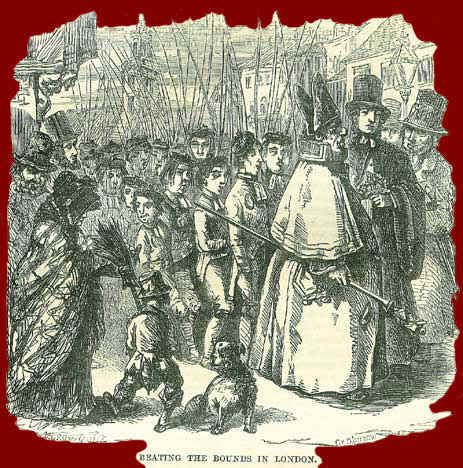
Today, when a "Beating of the Bounds" occurs, it tends to be in England, and to be a High Church Anglican thing. They have the old territorial parishes and the parish churches, since the protestant rebellion. English Catholics today, having less official status and being more scattered, take little interest in such local displays. Also today, it appears that New Age pagans like to attach themselves to Beating of the Bounds processions during Rogationtide, since it is a seasonal fancy-dress occasion. And they are joined by morris dancers, town criers, handbell guilds, and so on.
But the origins of the procession and the beating of the bounds are firmly Catholic. Perhaps someday, the vehicle of the Rogation Procession will be reunited to the Catholic practice that gave rise to it.
As time went by, with parish and property lines often marked by natural features like a protuberant stone, those boundary lines often became blurred and shifted, either through natural events (a stream drying up or shifting) or human action (moving a stone to move the property line). A parish might want to exclude a home from its territory if the inhabitants were poor and shiftless and likely to become a charge on the charity of the parish. Or it might want to include more affluent homes on the edge of the boundary.
So, over time, means were devised to create a living memory of just where the boundary line was, regardless of the natural features mentioned in any grants or deeds. What was devised was this. During one or more of the Rogation Processions, the young boys of the parish were brought along and enjoined to memorize the exact line of the boundary. The boys would be beaten with narrow sticks to ensure their proper memorization, and to chastise them if their memory was faulty. Thus, the "Beating of the Bounds."

Today, when a "Beating of the Bounds" occurs, it tends to be in England, and to be a High Church Anglican thing. They have the old territorial parishes and the parish churches, since the protestant rebellion. English Catholics today, having less official status and being more scattered, take little interest in such local displays. Also today, it appears that New Age pagans like to attach themselves to Beating of the Bounds processions during Rogationtide, since it is a seasonal fancy-dress occasion. And they are joined by morris dancers, town criers, handbell guilds, and so on.
But the origins of the procession and the beating of the bounds are firmly Catholic. Perhaps someday, the vehicle of the Rogation Procession will be reunited to the Catholic practice that gave rise to it.
Monday, May 18, 2020
Rogation Monday
From a University of Chicago site:
The Rogation Days are three (or four) days focused on agriculture and nature, where we pray for a good harvest, fruitful crops, good weather, and protection from flood, tornado, earthquake, and other natural disasters. Traditionally the Church offers these requests on the Monday, Tuesday, and Wednesday before the Feast of the Ascension, although some churches also add the Sunday before Ascension, before Rogation Monday. (The Catholic Church marks April 25 as the Major Rogation, and the days before Ascension as the Minor Rogation.)
Rogation comes from the Latin rogatio and French rogare, meaning "to ask." Fifth-century France was beset with a number of natural disasters, including floods, failing harvests, and an earthquake on Ascension (which always falls on a Thursday). In response to these calamities Mamertus, Bishop of Vienne, called for three days of prayer, fasting, and repentance, and this quickly became the custom for the three days preceding Ascension.
The observance of Rogation Days spread throughout Europe (In England, the days are also known as Gang-Days, Gang-Week, or Cross-Week.) Many churches led a procession around the town or parish boundaries on one of the Rogation Days, chanting a litany to the saints and offering prayers for a good year. This practice became known as "beating the bounds." George Herbert recommends this practice in A Country Parson (see chapter 25).
Many churches in farming communities continue to observe a traditional Rogation.Other churches are adapting the Rogation services to a technology-based society.
Read more about Rogation Days here, here, here, and here.
Daily Marian Prayer And Image
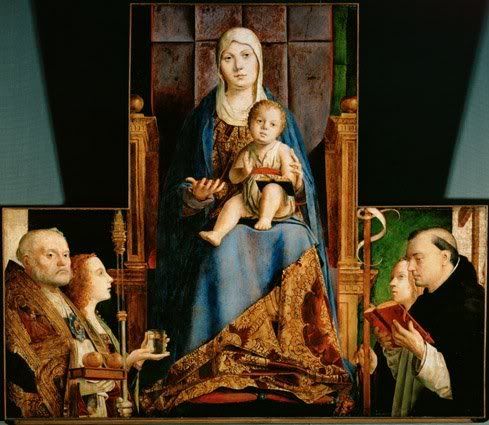
From The Glories Of Mary, by Saint Alphonsus de Liguori:
O Mary, my most dear Mother, in what an abyss of evils should I not now be, if thou hadst not so many times delivered me with thy compassionate hand! How many years ago should I not have been in hell, hadst thou not saved me by thy powerful prayers! My grievous sins already drove me there; divine justice had already condemned me; the devils already longed to execute the sentence; and thou didst fly to my aid, and save me without being even called or asked. And what return can I make to thee, O my beloved protectress, for so many favors and for such love?
Thou also didst overcome the hardness of my heart, and didst draw me to thy love and to confidence in thee. And into how many other evils should I not have fallen, if with thy compassionate hand thou hadst not so often helped me in the dangers into which I was on the point of falling! Continue, O my hope, to preserve me from bell, and from the sins into which I may still fall. Never allow me to have this misfortune—to curse thee in hell.
My beloved Lady, I love thee. Can thy goodness ever endure to see a servant of thine that loves thee lost? Then, obtain that I may never more be ungrateful to thee and to my God, who for the love of thee has granted me so many graces.
O Mary, tell me, shall I be lost? Yes, if I abandone thee. But is this possible? Can I ever forget the love thou has borne me? Thou, after God, art the love of my soul. I can no longer trust myself to live without loving thee.
O most beautiful, most holy, most amiable, sweetest creature in the world, I rejoice in thy happiness. I love thee, and I hope always to love thee both in time and in eternity.
Amen.
Sunday, May 17, 2020
Daily Marian Prayer And Image

From The Glories Of Mary, by Saint Alphonsus de Liguori:
O greatest and most sublime of all creatures, most sacred Virgin, I salute thee from this earth—I, a miserable and unfortunate rebel against my God, who deserve chastisements, not favors, justice, and not mercy.
O Lady, I say not this because I doubt thy compassion. I know that the greater thou art the more thou dost glory in being benign. I know that thou rejoicest that thou art so rich, because thou art thus enabled to succor us poor miserable creatures. I know that the greater is the poverty of those who have recourse to thee, the more dost thou exert thyself to protect and save them.
O my Mother, it was thou who didst one day weep over thy Son who died for me. Offer, I beseech thee, thy tears to God, and by these obtain for me true sorrow for my sins. Sinners then afflicted thee so much, and I, by my crimes, have done the same.
Obtain for me, O Mary, that at least from this day forward I may not continue to afflict thee and thy Son by my ingratitude. What would thy sorrow avail me if I continued to be ungrateful to thee? To what purpose would thy mercy have been shown me, if again I was unfaithful and lost? No, my Queen, permit it not; thou hast supplied for all my shortcomings.
Thou obtainest from God what thou wilt. Thou grantest the prayers of all. I ask of thee two graces; I expect them from thee, and will not be satisfied with less. Obtain for me that I may be faithful to God, and no more offend him, and love him during the remainder of my life as much as I have offended him.
Amen.











































































































